|
Faith is a gift. The ability to practice that faith, to worship freely, to share our faith in the public square, is also a gift. Each year, the Church in the US observes Religious Freedom Week. This year, we focus on Solidarity in Freedom. In Fratelli Tutti, Pope Francis writes, “Solidarity means much more than engaging in sporadic acts of generosity. It means thinking and acting in terms of community” (Fratelli Tutti, 116). The theme of Solidarity in Freedom forces us out into a global mindset, to one of community and fraternity. I’d like to focus on Religious Freedom Week through the stories of two men 400 years apart, Safa Al Alqoshy and St. John Southworth. At the 2018 Synod on Young People, the Faith, and Vocational Discernment, Safa Al Alqoshy, the only youth delegate from Iraq to the Synod, shared the story of the struggle of Iraqi Christians. While I didn’t meet Safa in my time at the 2018 Synod, I was around him during the 2019 Post-Synod Forum in Rome on Christus Vivit. His stories from the Synod followed him back to Rome where he was met with great admiration. Even though he had to arrive at the Forum late, the community that formed with him was immediate. Safa said to Crux, “It’s very important to pay attention that there is not only persecution by killing, there is a persecution by psychology, by feelings. You feel that you are alone, that you are not supported” (Crux). Safa expressed the reality of friends and family fleeing from Iraq, likely not to be seen again. He wasn’t just speaking generally about the people of Iraq, but from his own personal experience. He shared about two of his friends who were killed in a car bombing in 2009 and how Safa and his friends shared the common experience of saying, “see you next week” only to never see one another again. The temptation can be to take Safa’s story, and the story of so many Christians like him across the world, and to use it for our own advantage. To share it as an example, but one devoid of the personal reality which courses through its proverbial veins. When we share Safa’s story as just another example of the terrible persecution that Christians face, even worse as a “look what could happen to us next” story in relation to religious freedom in the US, we fail to show solidarity. We dehumanize those who have died, those who have been separated by the flight for freedom and safety, and we turn our suffering brothers and sisters into objects whose story we use for our perceived gain. No, instead, Pope Francis urges us to be in true solidarity with Safa and his friends and family, to think and act in community. We must pray for them, we must give when we can give, but we cannot use them as pawns in a game of politics that is antithetical to true solidarity. About 400 years before Safa there lived an English priest by the name of John Southworth. John was born around 1592 and was ordained in 1618 at the English College, Douai in France. St. John was arrested and imprisoned multiple times throughout his life, all for being a Catholic priest. Between his imprisonments, St. John would serve the plague victims of Westminster and provide sacraments to the sick and dying. St. John was arrested for the final time in 1654 and was sentenced to be hung, drawn, and quartered. His body was returned to France in 1655 and buried after having been, literally, put back together. During the war between the English and French in 1793, St. John’s body was buried in an unmarked grave where it remained until 1927 when the grave was discovered. He was canonized in 1970 by Pope St. Paul VI. John’s story is one of perseverance and solidarity. He was arrested multiple times and, eventually, killed for his Catholic faith. All throughout that time, he remained in solidarity with the English people, serving them through the sacraments, refusing to allow his own persecution to stand in the way of his Gospel mandate to be Christ to the world around him. Religious Freedom Week invites us to be, like St. John, fervent in our faith. It reminds us that, even in times of persecution, we carry on in sharing the Gospel. The week also invites us to remember those in our days who are persecuted, such as Safa and our brothers and sisters in Iraq. Solidarity means that we are united with them in prayerful community, but never using them for our own means- detaching their story from their persons. May we pray for all persecuted Christians and reflect upon the meaning of religious freedom this week with the hope of growing in solidarity with our brothers and sisters across our Universal Church.
0 Comments
In this week’s Gospel, we hear Jesus encouraging us to “Be watchful! Be alert!” in waiting for the coming of the Reign of God. Jesus uses the image of a homeowner who first secures his home and belongings before leaving to take a trip. Because his travels take him far from his property, the homeowner is intentional about ensuring that his own property is in order before setting out for a new road and destination. We might imagine the factors that would drive his painstakingly detailed preparations: extra security to protect his home from thieves, people to check on the resources of the house to make sure that it doesn’t flood or become too drafty without anyone inhabiting it, and perhaps also to achieve a sense of his own inner peace, that he has taken an active role in protecting his property. Jesus’ parable reminds us the importance of securing our own “inner” home and taking an active role in preparing ourselves for our own journeys in life. For me, this parable brings to mind the importance of engaging in our own formation. During my time as an apprentice catechetical leader as part of the University of Notre Dame’s Echo Faith Formation Leadership Program, I was introduced to the hard work of formation. Formation is the intentional cultivation of our spiritual, human, intellectual, and pastoral qualities as human beings that allows us to live out our call to holiness in a generous and healthy way in ministry. In Echo, I entered the world of professional ministry for the first time. I learned quickly that ministry calls us to give deeply of ourselves; however, in being new to ministry, I neglected to secure my own “inner home” of my mind, heart, body, and soul before journeying out of myself to encounter others in the work of evangelization and catechesis. I was susceptible to the outside thieves of comparison, results-driven ministry, and how I could best show off my training and theological knowledge to those I served. In order to make an offering of my own life in ministry that truly served the coming of the reign of God and did not depend on my own efforts or ego, I had to learn to engage my own formation. I intentionally cultivated a life of prayer, took care in applying my studies in catechesis and ministry to my work, and reflected and healed through a relationship with a therapist. Over time, I felt revitalized and more able to cooperate with the Spirit’s work in my life and ministry because I was no longer focused on just trying to survive. Service Suggestion: In the Christian life, we are called to accompany others in the life of faith. A relationship of accompaniment is a perfect setting for formation; it allows us to lean on and learn from each other how best to imitate Jesus in our life. Is there someone in your own life, especially in difficult circumstances, who you might intentionally accompany this Advent? How can you help them secure their own “inner” house on the journey of faith through walking with them in solidarity, mutuality, and listening? Focus: Spirituality By failing at trying to minister based on my own efforts to be the most knowledgeable and most available to those I served, I learned that with the help of the Holy Spirit, I had to engage my own formation so I could be awake, alert, and ready to make of myself a healthy and holy offering. Through formation, I grew to become a minister with her house in order while being on the journey of faith and ministry, prepared to meet Jesus in those I served “whether in the evening, or at midnight, or at cockcrow, or in the morning.” How can you aim to put your own inner house in order this Advent? Are there spaces in your life where you can engage in your own formation in order to make a more generous and healthy offering of your life? Prayer God, Isaiah speaks out “Yet, O Lord, you are our father; we are the clay and you the potter: we are all the work of your hands.” We remember that our lives are the spaces where our salvation unfolds, where we are formed and shaped into art by you, the Artist of Artists. Send your Spirit upon us to be moved by those you place in our path so we may be formed in compassion, empathy, and solidarity. Strengthen us to take an active role in shaping our world to be a reflection of your infinite love through the witness of our lives. Amen.
11/19/2020 Fratelli Tutti: On Fraternity and Social Friendship - Top Quotes from Pope Francis' Latest EncyclicalRead NowOn the vigil of the Feast of St. Francis of Assisi, the saint who influenced the choosing of Pope Francis’s papal name, Pope Francis released the encyclical Fratelli Tutti on fraternity and social friendship. Beginning with the example of St. Francis himself and continuing with the parable of the Good Samaritan, Pope Francis calls the world once again to consider the common good and to strive for unity based on fraternal charity. In doing so, he reminds humanity of an important truth: that we belong to one another. In this blog series, I’ll be sharing some of my favorite quotes from the pope’s latest encyclical. May they bring you peace, hope, and joy as we continue to grow and adapt in the midst of the COVID-19 pandemic and its effects on our world. “Let us dream, then, as a single human family, as fellow travelers sharing the same flesh, as children of the same earth which is our common home, each of us bringing the richness of his or her beliefs and convictions, each of us with his or her own voice, brothers and sisters all” (FT, 8) Today I believe that many of us have forgotten to dream. We are mired down with anxiety, isolation, pandemic fatigue, stress, financial and political uncertainty, or disillusionment. In Fratelli Tutti, Pope Francis reminds us to dream and to hope. There is room for each person at God’s table. Each person brings their own gifts, talents, knowledge, expertise, experiences, and self to the world. Rather than reject our differences, it is important to acknowledge and even celebrate the richness in our human diversity. We are many parts, but one body. Let us celebrate our humanity and practice dreaming once again—of unity, of peace, of justice, of truth, of love. “Instances of racism continue to shame us, for they show that our supposed social progress is not as real or definitive as we think” (FT, 20). As several incidents within the United States have reminded our nation once more, racism is a sin which directly contradicts the truth that all people are born with equal dignity in the image and likeness of God. The sin of racism continues to be present in our world, and eliminating it involves the intentional work and learning of each person. This process includes listening to other’s stories and journeys, learning about and from history, conducting a personal examination of conscience, and intentional action to change systems and structures of racism. Pope Francis reminds us that racism is intolerable, not only among Catholics, but among mankind as a whole. “True, a worldwide tragedy like the Covid-19 pandemic momentarily revived the sense that we are a global community, all in the same boat, where one person’s problems are the problems of all. Once more we realized that no one is saved alone; we can only be saved together” (FT, 32) Although the COVID-19 pandemic has wrought havoc on the way we live, times of hardship also remind us of what’s important. Often, we re-focus on our priorities because we are reminded not to take them for granted. Many turn to faith, family, and community and are more likely to help those who are less fortunate. Practicing gratitude is an essential component of not only surviving but thriving in times of hardship. Pope Francis points out that tragedies such as COVID-19 can bring humanity together in a common bond of fraternity. Let us turn outward during this time and use our talents and resources to bring joy, love, and hope to others. “We have the space we need for co-responsibility in creating and putting into place new processes and changes. Let us take an active part in renewing and supporting our troubled societies. Today we have a great opportunity to express our innate sense of fraternity, to be Good Samaritans who bear the pain of other people’s troubles rather than fomenting greater hatred and resentment” (FT, 77) Co-responsibility is an important theme at the Catholic Apostolate Center that has been given even greater attention in the Church today. It involves collaboration from the beginning and values the important contributions each person brings to the Church and world. St. Vincent Pallotti, patron of the Catholic Apostolate Center, understood that the Church cannot thrive and spread the Gospel without the active participation of the clergy, religious, and laity. Today, Pope Francis reminds us that we all have a role to play in the renewal of the Church and world. This begins when we can accompany our brothers and sisters, stand in solidarity with those who are hurting, and bring them the joy of the Gospel. “Solidarity finds concrete expression in service, which can take a variety of forms in an effort to care for others” (FT, 115) Charity comes alive in works, just as St. Paul says, “faith without works is dead.” The Gospel is lived today through our actions—an understanding promoted in Catholic Social Teaching and exemplified through the corporal and spiritual works of mercy. It is one thing to express solidarity with our brothers and sisters, but a very different thing to walk alongside and serve them. Pope Francis is calling us to both. As we are reminded in Gaudium et Spes, “Man…cannot fully find himself except through a sincere gift of himself” (24). “Nor can we fail to mention that seeking and pursuing the good of others and of the entire human family also implies helping individuals and societies to mature in the moral values that foster integral human development...Even more, it suggests a striving for excellence and what is best for others, their growth in maturity and health, the cultivation of values and not simply material wellbeing. A similar expression exists in Latin: benevolentia. This is an attitude that ‘wills the good’ of others; it bespeaks a yearning for goodness, an inclination towards all that is fine and excellent, a desire to fill the lives of others with what is beautiful, sublime and edifying” (FT, 112) In the Christian worldview, politics, economics, culture and society must be built and exist for the common good. They are man-made structures designed to serve this purpose. In pursuing the common good, we aim to create a society in which mankind can flourish as a result of respect for every person’s inherent dignity. As St. Thomas Aquinas stated, “Love wills the good of the other.” Pope Francis echoes this truth and reminds us that willing this good is comprehensive: we must care about one another’s spiritual well-being as well as our physical well-being. When man’s fundamental needs are met—when he is cherished, nurtured, respected, fed, and rested—he is better able to “fill the lives of others with what is beautiful, sublime and edifying.” He is able to reach out and better experience and rest in the divine. To learn more about Fratelli Tutti, please click here. Can you imagine yourself as one of the apostles? Put yourself in their shoes. You were moved by Jesus. His teachings spoke to your heart. When you were with him, you felt incredibly alive, free, loved and full of hope. No one persuaded you; you wanted to follow him. You were there when Jesus fed the 5,000, gave sight to the blind, and raised a young man from the dead. He received a royal welcome into Jerusalem. You celebrated Passover with him. You were also there when the soldiers came and dragged Jesus off to be crucified. Scared for your own life, you hid in the shadows abandoning him to death on the cross. You were a puddle of fear, sadness, anger, and despair. You disgust yourself. Disoriented, you stumble upon the others. You look to Peter but that rock is crushed, broken by grief and disbelief. The Sabbath comes and goes. It’s over—time to pick up the pieces of your life and move on. But just as you begin to leave, two female disciples arrive with astonishing news. Jesus is alive! Remember the mountain in Galilee? Remember what he said? Go there and you will see him. Of course, you go. You gather with the other disciples and make arrangements for the journey. It will take four days. Along the way, you cry, confess, and tell stories. You see the mountain in the distance. A lone person is descending from the top. Before you know it, Jesus is approaching you. You are gaping-mouth-open astonished. Some fall down to worship him. Others cannot believe it. Peter collapses to his knees. And still, Jesus approaches. He embraces you. You are alive again. Jesus reaches out to everyone. He turns to Peter last, lifting him up, restoring his strength. Jesus calls you together. "All power in heaven and on earth has been given to me. Go, therefore, and make disciples of all nations, baptizing them in the name of the Father, and of the Son, and of the Holy Spirit." He pauses here, letting his eyes meet each one of us. Some of us are giddy with joy, others cannot stop the tears. "Teaching them to observe all that I have commanded you." Suddenly, your heart begins to burn within you. You have a lot to say, a lot to share, a lot to tell. You remember with crystal clarity everything he taught, every moment he was with you, all the experiences you shared. You know now who you are and what you are about. It is time to go. But you hesitate. You want to stay. Jesus knows your heart. He is speaking again. Amazingly, he is talking to everyone and only you at the same time. "Behold, I am with you always, until the end of the age." Stay here. Stay with Jesus resting his eyes in yours. You have a lot to offer. You know who you are, what the Lord means to you, what he asks of you, and what he has given you. The stark truth of mission is hard to believe. God sends you into the world because there is something the world needs that only you can give. World Mission Sunday reminds us that we are sent to the whole world. As disciples of Jesus, there is no place or people beyond our sphere of concern. Pope Francis reminds us that mission is an "immense work of mercy, both spiritual and material." Last year, many of us “walked with Francis.” This year, let us be with Pope Francis in the mission of mercy. Let us renew our call to mission - to care about everyone, everywhere. I offer three suggestions on how to renew the call to mission:
Jesus is sending us out to all nations and he will be with us always. We will be astonished at how the Lord will reveal himself to us through mission. It is time to go. **This post was originally posted on October 20, 2016. Two weeks ago, I was walking from my cozy warm apartment in the Northeast part of Washington, D.C. to Union Station to meet up with a friend for dinner. It was 18*F (-7*C) outside and the wind was just starting to pick up. There were forecasts of snow in the next few days. I was bundled up with a wool sweater, socks, jacket, scarf, and gloves. About ten minutes into my walk, I started to regret my decision to walk and wondered if I should’ve called a cab. As I approached Union Station, I could see the Capitol building lit up in the distance. It was there that I saw 8 people lying on the streets completely covered with layers and layers of clothing and blankets. I immediately forgot my own brief and temporary plight. It was a stark and chilling reminder of the great poverty that still exists not only in other countries, but right here in the United States in our capital city. Each January, the Church in the United States recognizes Poverty Awareness Month and takes up Pope Francis' challenge “to live in solidarity with the poor.” Last year, Pope Francis called for the observance of the very first World Day of the Poor. This call was not just for faithful Catholics, but for people of all nationalities, creeds, and socioeconomic backgrounds. As he said in his message for the first World Day of the Poor, “Love has no alibi. Whenever we set out to love as Jesus loved, we have to take the Lord as our example; especially when it comes to loving the poor.” The church and world responded with countless acts of charity and kindness to the poor. Poverty is a massive issue with far too many heartbreaking statistics for us to consider it on only one day each year. It is a concern that needs constant attention and awareness that we can cultivate on a daily basis. Poverty does not simply come in the form of homelessness, but can manifest itself in many different ways. It can be manifested in our neighbor who has to choose between buying prescriptions or groceries, or in the child who cannot focus on school because they have not eaten the proper food they need. It can be manifested in the single mother who cannot afford childcare while she works. Each of us can work towards helping to alleviate poverty. Here at The Catholic University of America, we run a large number of different programs throughout the year that highlight various forms of poverty and ways to help. Twice a year we have massive service days during which we send nearly 900 students to help local organizations that serve the poor. Every week we have twenty opportunities for students to serve the poor across seven different service sites. Some of these include going to soup kitchens or after-school centers and volunteering with the Missionaries of Charity. One of the most highly attended opportunities is a recurring homeless food run in which students take food and supplies to areas of D.C. with large homeless populations. The students do not simply pass out food, but sit and talk with the homeless. They get to know poverty on the most human level possible. They offer their resources, time, and love to those in need. These types of efforts enable us not only to give the poor material goods and the gift of our time, but also help us personally grow. Walking in solidarity with our brothers and sisters and encountering them leaves us transformed. As Pope Francis wrote in Evangelii Gaudium, “This is why I want a Church which is poor and for the poor. They have much to teach us. Not only do they share in the sensus fidei, but in their difficulties they know the suffering Christ. We need to let ourselves be evangelized by them…” Throughout the year, I encourage you to consider participating in or making your own outreach to help those in need—and to bring a friend. Let us allow ourselves to be evangelized by the poor, live in solidarity with them, and work to alleviate their suffering. As St. Vincent Pallotti, the patron of the Catholic Apostolate Center, reminds us, “Remember that the Christian life is one of action; not of speech and daydreams. Let there be few words and many deeds, and let them be done well.” Questions for Reflection: What are some concrete ways you can help alleviate poverty? Has a personal encounter with the poverty of another ever impacted your spiritual life? This past September, a colleague and I traveled to three cities in the U.S. to discuss with local ministry leaders ways in which Catholic Relief Services (CRS) could engage young adults. Our basic question was this: How can CRS contribute to the conversations folks in their 20s and 30s are already having around issues of peace, justice, and global solidarity? Two very clear, and slightly discordant, ideas emerged. The first: folks in their 20s and 30s want to offer their time to serve those in need. The second: we as Church might do better to shift from doing good for a world in need to being good for our world. What do I mean by this? The instinct to do good—to be a service to others, to give of ourselves, to respond in charity to the Gospel invitation to love our neighbor—is something to be applauded. In fact, integrating service into young adult ministry was a priority we heard time and again during our conversations. But not all world-changing, do-good ideas are created equal. In fact, some can be quite harmful. (For one example from some of CRS’ work that illustrates this general point, check out our Changing the Way We Care initiative on orphanages.) I’m not saying we shouldn’t dedicate time, talent, and treasure to helping those in need—both in our own communities and around the world. But we should challenge ourselves to be intentional about our initiatives, to investigate the real impact of our efforts—both intended and unintended. We should also ask ourselves who we are really serving: our own sense of self-worth or the real common good. I write all this by way of reflection on Pope Francis’ calling for a World Day of the Poor, the first of an annually recurring day that begins November 19, 2017. (Click here to read about it in the pope’s own words.) When we think of poverty, our knee-jerk reaction may be to rush to the nearest shelter with old clothes in hand. It may be to donate to a worthy cause. It may be to jump on a plane and fly across the world ready and able to build a house for a family without one. None of those things are bad, right? People need and deserve clothing and shelter, and charitable donations fuel so many organizations like my own. But intentionality demands that we challenge our own assumptions. Is the local shelter looking for the kinds of clothing I’d like to give, and do they have capacity to sort through them? Does that distant country need me to build a house, or is there a local engineer who is better able to accomplish the job? Do I know what percentage of donations an organization puts toward actually helping those in need? These are questions I myself have had to wrestle with, and the answers are different in every situation. But they must be asked. Why? Because they help me remove my own ego from the situation and instead make room for the true needs—and solutions—of others. Pope Francis challenges us to go beyond the doing—which is unmistakably important—to inhabit a new way of living: “We may think of the poor simply as the beneficiaries of our occasional volunteer work, or of impromptu acts of generosity that appease our conscience. However good and useful such acts may be for making us sensitive to people’s needs and the injustices that are often their cause, they ought to lead to a true encounter with the poor and a sharing that becomes a way of life.” So, then, as we reflect on this first World Day of the Poor, I challenge all of us to not simply do good, but to be good—to integrate God’s vision for humanity not simply into our acts of charity but into our daily choices, our lifestyles, and our long-term goals. Question for Reflection: How can you follow Eric's advice and not only do good, but be good? Interested in joining CRS in conversation around these issues? Join our new initiative for folks in their 20s & 30s CROSSROADS en el camino. To learn more about Catholic Social Teaching, please click here.
This past weekend I was fortunate to attend my first Mid-Atlantic Congress for Pastoral Leadership in Baltimore, Maryland with the Catholic Apostolate Center team. It was the first conference of this kind that I had ever attended, and it was a wonderful experience for me. I spent the weekend with several other members of the Catholic Apostolate Center team, and we met so many people and organizations who are doing incredible work. It was great to connect with new people and reconnect with those whom we already work with. At MAC, the Catholic Apostolate Center sponsored several sessions with opportunities for collaboration and conversation among different groups. Being grounded in the spirituality of St. Vincent Pallotti, collaboration is something the Catholic Apostolate Center are especially focused on. In the few days after we returned home, I found myself wondering how the spirit of collaboration that I saw at MAC could also continue with me on my Lenten journey.
As I was sitting at Mass yesterday for Ash Wednesday, I was reflecting on my time this past weekend. I realized that I often think of the Lenten season as a time for personal growth and reflection, a time where I can examine my own faith. And it is true. Lent is a very individual experience. But as I sat in Church yesterday next to a close friend, I realized that Lent doesn’t just have to be an individual journey. People in our lives can provide valuable support and insight, and sharing our journey with others this Lent can expand on our personal growth. Leaving Mass, I had a conversation with a number of people about the fact that Ash Wednesday Mass is so well attended, despite it not being a holy day of obligation. We talked about the sense of unity we feel as we begin the Lenten season together, all marked with our ashes. It is unusual to think of Lent as a time of collaboration, but Ash Wednesday is one of the days where our Catholicism is most outwardly on display. A non-Christian friend calls Ash Wednesday “Spot the Catholics Day,” and it makes me laugh, but also makes me feel proud to display my faith so openly. On Ash Wednesday, we walk around and see others with the marks of ashes on their forehead and feel a sense of solidarity with them, even without knowing them. We have this unspoken bond, and the breath of the Universal Church becomes very apparent. Collaboration is about working with others for a common goal. I believe that Ash Wednesday and the entire Lenten season is a reminder that our own struggles are what unite us as members of the community of faith. During this Lenten season, I would challenge you to share your personal journey with others in your life: share your joys and also your struggles. Lent is a personal time, but the sense of peace we so often find is much better when shared with others in our lives. We are a community of believers, and Lent is a time to reflect and remind ourselves both of our personal commitment to our faith and to remind us of our place within this community. Rebecca Ruesch is the Blog Editor for the Catholic Apostolate Center I am scared of Lent. There: I said it. This cradle Catholic, with plenty of Lents under her belt, is scared of one of the most sacred liturgical seasons in the Church.
I’m not saying I don’t love it. I do. I loved when my favorite priest buried the “Hallelujah,” and then emptied our Church of decoration, only adding more as we got further into Lent and into spring. I love (well, love/hate) fasting, and the way my mind is automatically drawn toward my dependence on God and solidarity with others. And my favorite color is purple. So, yeah, Lent is my season. But I’m scared of it. Truth be told, I feel like I’m bad at Lent – never repentant enough, never serious enough, never sacrificing or doing enough. When I was little, I made charts to track my progress through the 40 days free of candy, or Facebook, or whatever I gave up. When I got older, I got smarter and started adding to my Lenten routine. More Scripture, more prayer, more almsgiving. Usually I do okay striking a balance between sacrificing for God and building toward God, but this year…all bets are off. This year, away from home, family, and friends, I’ve been feeling so restless. Isn’t this season a time to rest in God, and prepare our hearts for that life-changing Resurrection? Part of me feels like, “God, haven’t I given up enough? I’ve followed you into this desert that is rural Kentucky!” But part of me (and I’m sure this is the part the Holy Spirit is dealing with) knows there is always more. We can always remove more that stands in our way to the fullness of God. Yet, as Lent draws to an end, I still feel like I am figuring out what I’m doing. My housemates have all dutifully prayed; they have gracefully denied sweets and coffee and swear words. All I’ve managed to do is plod along through Merton’s Seven Storey Mountain, because hey – third time’s a charm, right? In the meantime, I thumb through my notebook still rewriting different versions of my Lenten plan. And there lies my problem; I am still trying to plan Lent. I have turned it into some Christian New Year’s Resolutions/Get-Right Plan for Lent 2013. If I “do” A, B, and C, then the Resurrection will surely come! If I “do” Lent with enough sacrifice, enough Bible study, enough whatever, then I’m sure to feel the Resurrection like never before. But maybe that’s not the way to do it. The Rev. William Bradley, in a sermon given on the first Sunday of Lent, said, “The difference between us and Jesus is that he doesn’t run from…insecurity, rather he embraces, inhabits it as part of his life with God. Rather than trying to fill it with people, things, drugs, and busyness, he sits with his emptiness to see if God will show up.” I haven’t quite figured out what I’m “doing” this Lenten season, and maybe that’s okay. Maybe I need to simply take my restlessness to God in prayer and sit with it, until I’m no longer with the restlessness but with the peace and grace that is God. Only once I can settle into being this Lent, can I start to actually do the life-giving practices of this holy season and rejoice in His resurrection that lies ahead. Katherine Biegner recently graduated from Assumption College and is currently serving as a tutor and mentor in the Christian Appalachian Project in rural Kentucky. Decisions made in the voting booth are deeply personal and reflect a combination of our experiences and beliefs. And as Catholic American citizens, now is a critical time. The outcome of the presidential election will have far-reaching consequences and it is our responsibility to seriously consider our choice of leaders and policies that will guide our nation and our state.
Catholic voters are once again caught between their desire to participate in civic life and the choice of candidates for elected office falls short of a vision of the common good as rich and full as Catholic social teaching presents. Consequently, many have become subject to the mentality that being Catholic and politically active are incompatible. But this is not so. Catholics are called to understand and accept the Church’s teaching as a means of becoming more engaged in political life. It may be challenging, but it is something we have to wrestle with. At an address this past month, Archbishop Chaput of Philadelphia said, “We believe in the separation of Church and State, but that is not the same thing as separation between faith and politics. Faith is what we believe, politics is how we act.” He advised Catholics to “apply the principles of Catholic social teaching – such as the common good and subsidiarity”, to their voting decisions. We have the duty as citizens to participate in our own governments for the sake of the common good. By not doing so, we abandon the political process and risk unjust laws being formed. Poorly formed legislation and leadership may come about anyway, but it should not come about as the result of Catholics disregarding the process. Casting an informed vote is one of the best things we as Catholic citizens can do for our country. It is the duty of citizens to contribute – along with the civil authorities – to the good of society in a spirit of truth, justice, solidarity and freedom. “The love and service of one’s country follow from the duty of gratitude and belong to the order of charity" (CCC 2239). And so as Catholic citizens, we enlighten and develop our consciences as citizens in accordance with the principles of Catholic Social Teaching. One straightforward and immediate way Catholic voters can make a meaningful contribution to public discourse is to draw the larger public’s attention to issues that are essential to Catholic social thought. The most essential of these is the dignity of every human person and each one’s basic right to life from conception to natural death. Respect for human dignity has an essential role in the respect of all human life, especially the fundamental right to life. It is a natural principle that is supported by our beliefs; it is our faith, as His Holiness states in Porta Fidei, that “opens our eyes to human life in all its grandeur and beauty.” As Catholic voters, we have to see ourselves as bridge builders. According to Bishop Richard Pates of Des Moines, Iowa, and Chairman of the Committee on International Justice and Peace for the USCCB, “The Catholic vision is one of collaboration, not coercion, among individuals, governments, businesses and other institutions.” Voting in this election is not based on profit or having a winning ideology. Our “Catholic vision” is one that creates an environment in which all people can develop and ultimately flourish. Along with tens of millions of fellow citizens, I urge you, Catholic voters, to cast your ballot today. Commit yourself to creating conditions that fully respect the dignity God has bestowed upon all of us. Our political responsibility doesn't stop at the polls this Election Day. We must always respond to the social issues, locally and nationally, that affect the dignity in which we are all created. Sarah Morris is a senior Politics major at The Catholic University of America. |
Details
Archives
July 2024
Categories
All
|
About |
Media |
© COPYRIGHT 2024 | ALL RIGHTS RESERVED



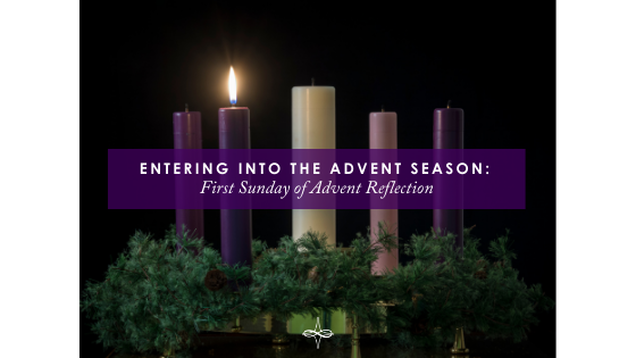
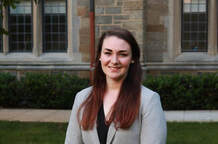
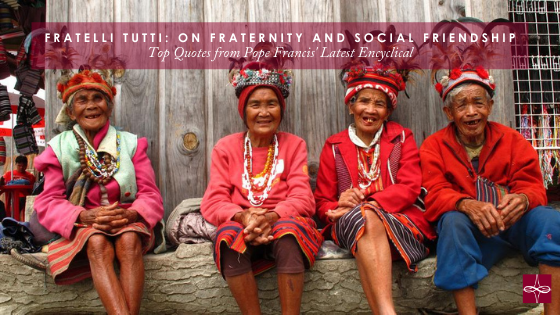

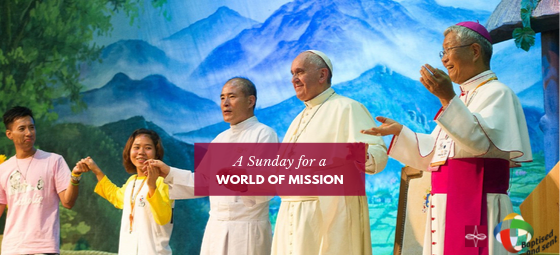

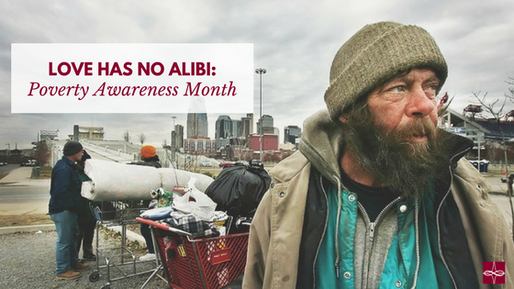

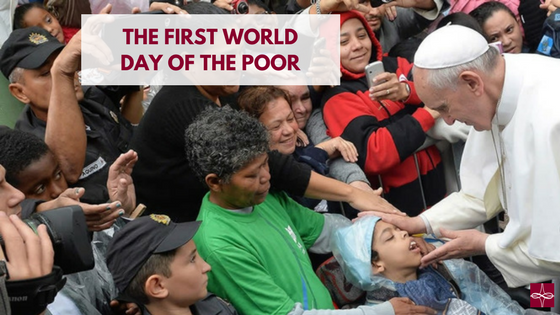

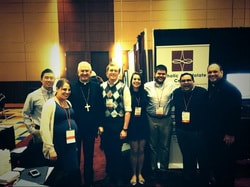


 RSS Feed
RSS Feed